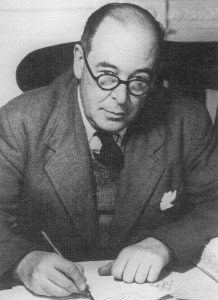 C. S. Lewis, writing in Reflections on the Psalms, contrasts the anger displayed toward evil men in some of the psalms with the apparent lack of vindictiveness found in some pagan writings. Does this reveal a better spirit among the pagans? Not so, he says.
C. S. Lewis, writing in Reflections on the Psalms, contrasts the anger displayed toward evil men in some of the psalms with the apparent lack of vindictiveness found in some pagan writings. Does this reveal a better spirit among the pagans? Not so, he says.
He gives a personal example to illustrate how lack of anger can often be the worst response. During WWII, he was taking the train one night (as he often did, traveling to speak and then returning home late) and found himself in a compartment with a number of young soldiers. He was more than a little dismayed by the comments he heard:
Their conversation made it perfectly clear that they totally disbelieved all that they had read in the papers about the wholesale cruelties of the Nazi régime. They took it for granted, without argument, that this was all lies, all propaganda put out by our own government to “pep up” our troops. And the shattering thing was, that, believing this, they expressed not the slightest anger.
It’s worth noting that Lewis himself rarely read the newspapers because he considered most of what was contained therein to be lies, yet he certainly had no reason to doubt what the papers were saying about Hitler and his horde. The attitude of the soldiers stunned him:
That our rulers should falsely attribute the worst of crimes to some of their fellow-men in order to induce others of the fellow-men to shed their blood seemed to them a matter of course. They weren’t even particularly interested. They saw nothing wrong in it.
If you were being asked to go to war and possibly lose your life, and you were convinced that the rationale for doing so was based on a fabric of lies told by your government, wouldn’t that bother you more than a little? Apparently not in this case. Lewis then compares these apathetic soldiers to psalmists who didn’t hide their anger:
Now it seemed to me that the most violent of the Psalmists—or, for that matter any child wailing out “But it’s not fair”—was in a more hopeful condition than these young men. If they had perceived, and felt as a man should feel, the diabolical wickedness which they believed our rulers to be committing, and then forgiven them, they would have been saints.
But not to perceive it at all—not even to be tempted to resentment—to accept it as the most ordinary thing in the world—argues a terrifying insensibility. Clearly these young men had (on that subject anyway) no conception of good and evil whatsoever.
 Loss of the entire concept of good and evil betrays a society wandering in a fog of moral apathy. “Thus the absence of anger, especially that sort of anger which we call indignation,” Lewis concludes, “can, in my opinion, be a most alarming symptom. And the presence of indignation may be a good one.”
Loss of the entire concept of good and evil betrays a society wandering in a fog of moral apathy. “Thus the absence of anger, especially that sort of anger which we call indignation,” Lewis concludes, “can, in my opinion, be a most alarming symptom. And the presence of indignation may be a good one.”
It’s perfectly fine to feel righteous indignation toward evil. In fact, if we feel nothing at all when confronted with the evils of our day, there is something terribly wrong with us.
